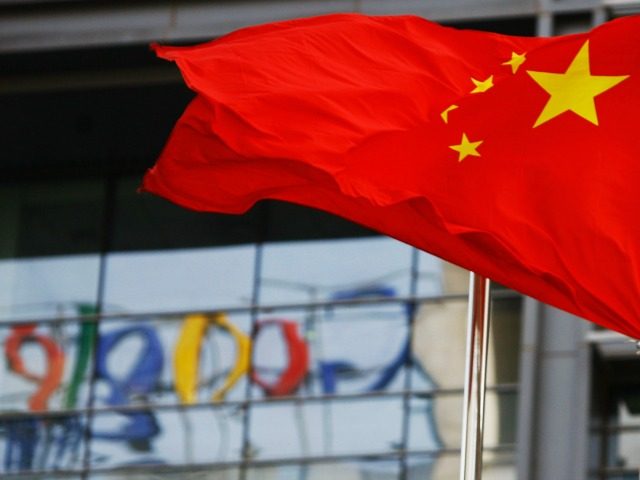A new report claims that Chinese authorities have laid out plans to Google to involve the tech titan in suppressing the speech and increasing surveillance on the country’s Uighur ethnic minority.
Business Insider reports that Chinese authorities reportedly laid out their plans to increase surveillance on China’s Uighur ethnic minority group to Google as the government expects tech firms to aid the goverment in its efforts. Authorities in Xinjiang, a region in western China, recently passed new local laws which demonstrate how officials should detect banned speech in efforts to crack down on the Uighur population.
Xinjiang is currently home to approximately 11 million Uighurs, a mostly-Muslim ethnic minority, which are closely watched by the Chinese government. The government subjects them to intense surveillance including 40,000 facial recognition cameras across the region, DNA samples, and blood types of individuals recorded. The most recent laws passed in Xianjing make it clear that Chinese officials expect tech companies to aid in their surveillance efforts, meaning Google was likely made aware of the government’s plan for the Uighur population in Xinjiang.
Breitbart News has reported on China’s Uighur population extensively, Breitbart News reporter Frances Martel reported in March of this year on the arrest of dozens of relatives of Radio Free Asia reporters in China for covering the Uighur situation:
Gulchehra Hoja, one of the outlet’s veteran journalists, published a Facebook post this week accusing the Xi regime of detaining twenty relatives, including her parents, brother, and “at least eight cousins” in an attempt to pressure her to abandon her work, according to Amnesty International. The Washington Post names Shohret Hoshur, Mamatjan Juma, and Kurban Niyaz as three other RFA journalists whose families have suffered similar consequences, noting that three of the four (excepting Niyaz) are American citizens. The Post explains:
All three of Hoshur’s brothers were jailed in Xinjiang in 2014, but two were released in December 2015 after the U.S. government protested. The third, Tudaxun, was sentenced to a five-year jail term in 2015 on charges of endangering state security and remains in prison.
Hoshur said the other two brothers were detained again in September and taken to the Loving Kindness School, a political re-education center in the city of Horgos. Hoshur said a source told him that around 3,000 people have been detained there.
“My father is paralyzed on one side and needs a constant care. My mother has recently had a surgery on her feet and is very weak,” [Hoja] said in the statement. “I need to know where they are and that they are OK. I need to be able to speak to them. They have not committed any crime.”
If Google’s “Project Dragonfly” censored Chinese search engine becomes a reality, the company could become even more complicit in the further surveillance of Chinese citizens. Article 28 of the newly introduced laws in Xinjiang states that telecommunications operators must: “put in place monitoring systems and technological prevention measures for audio, messages, and communication records” that may have “extremifying information.”
“Extremification” is defined in vague terms in the laws with acts such as “interfering” with individual’s ability to have contact with those of other ethnicities or faiths, and “rejecting or refusing public goods and services.” According to the laws, when telecommunications companies come across content that Chinese authorities deem unfavorable they must: “stop its transmission, delete the relevant information, keep evidence, and promptly report the case” to Chinese authorities. Companies will also have to “assist the public security organs in conducting a lawful disposition,” which means providing personal user info to Chinese authorities. Google would be forced to comply with these laws.
After details of Google’s Project Dragonfly leaked, many came out in opposition to the company’s plans to operate in China. 14 human rights organizations published an open letter to Google CEO Sundar Pichai which stated: “Google risks becoming complicit in the Chinese government’s repression of freedom of speech and other human rights in China.”
Vice President Mike Pence stated: “Google should immediately end development of the ‘Dragonfly’ app that will strengthen Communist Party censorship and compromise the privacy of Chinese customers.”
Google has stated that they are “not close” to launching a search engine in China but recently leaked discussions paint a different picture. Google’s Keith Enright told the Senate Commerce, Science and Transportation Committee on September 26th that there “is a Project Dragonfly,” but said, “we are not close to launching a product in China.” Google’s search engine chief, Ben Gomes, told a BBC reporter at Google’s 20th-anniversary celebration event: “Right now, all we’ve done is some exploration, but since we don’t have any plans to launch something, there’s nothing much I can say about it.”
But privately, discussions surrounding Project Dragonfly have painted a different picture. According to one Google source, Gomes’s comments to the BBC about Project Dragonfly were “bullshit.” Sources told the Intercept that Gomes informed employees in July that the company planned to release the censored Chinese search engine as soon as possible and employees were to prepare the engine to be “brought off the shelf and quickly deployed” once they received approval from Beijing.
Breitbart News’ full report on the issue can be found here.
Lucas Nolan is a reporter for Breitbart News covering issues of free speech and online censorship. Follow him on Twitter @LucasNolan_ or email him at lnolan@breitbart.com

COMMENTS
Please let us know if you're having issues with commenting.